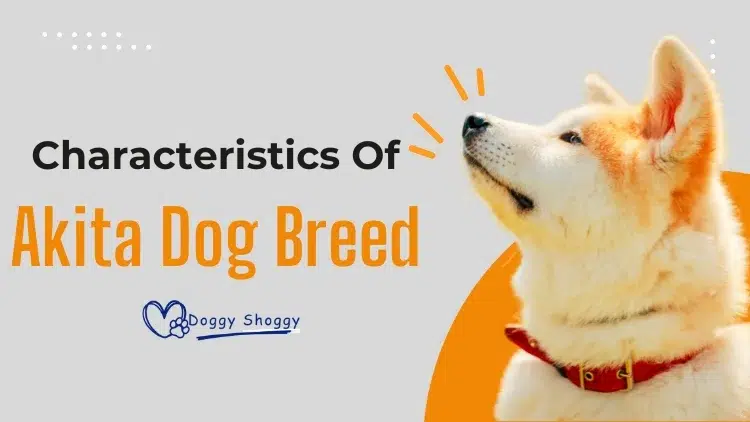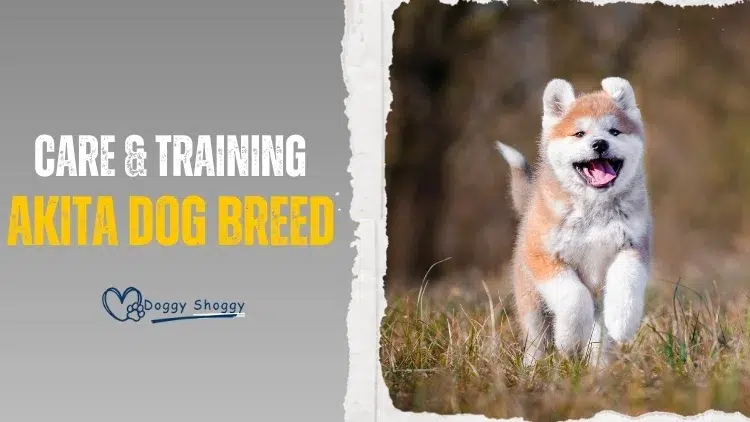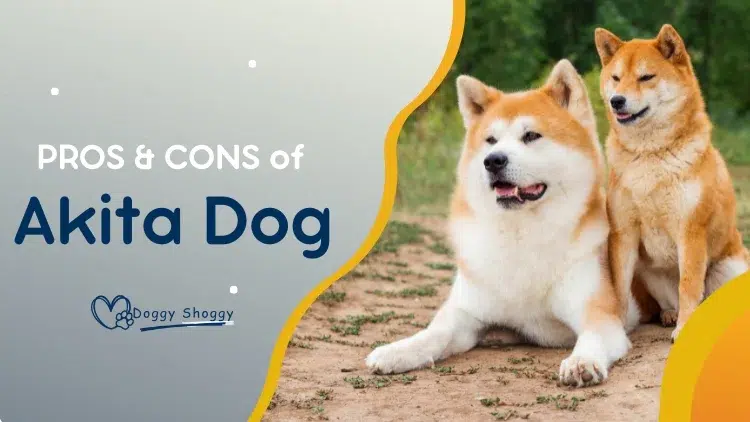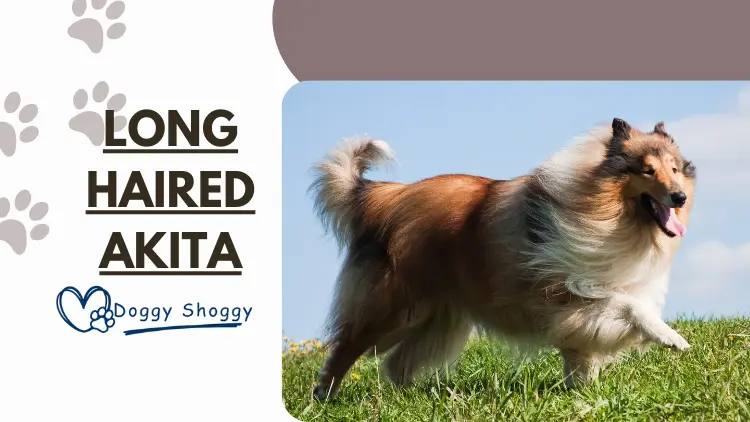Akita Dog Breed
The Akita is a unique, strong dog breed loved for its noble look and loyalty. Originally from Japan, It was the first breed to hunt big animals like deer and bears.
They have a unique look with a strong body, a head like a bear, and a tail curating up over their back. these dogs are known for being calm and keeping to themselves, which makes them great protectors and friends for people who understand them well.
Table of Contents
History of the Akita
This dog has a long and unique history in Japan. They were first bred as strong hunting dogs that could take on big animals like deer and bears. People admired them for their bravery and determination.
As time passed, this dog became an important symbol in Japanese culture, representing loyalty, honour, and bravery. However, their numbers decreased significantly during World War II, so people worked hard to keep the breed alive. Nowadays, these dogs are loved worldwide for being great pets and for their ability to work alongside humans.
Akita Temperament
Akitas are loyal and calm dogs. They might not be very friendly with people they don’t know, but they love their family a lot. They’re usually quiet but can be brave and protective when needed. It’s important to teach them good manners and social skills when they’re young so they grow up to be well-behaved and confident pets.
Akita Care and Maintenance
To keep Akitas healthy and happy, taking good care of them is important. They have thick fur that needs to be brushed often to prevent it from getting tangled and to reduce shedding. Akitas also need regular exercise to stay fit and keep their minds active. Giving them the right food and ensuring they see the vet regularly are important to keep them healthy overall.
Akita Exercise Needs
Even though Akitas are big dogs, they don’t need much exercise. But it’s still important to take them for walks daily and play with them to keep them strong and happy. Akitas likes doing things that make them think and move, like learning new tricks, running through obstacle courses, and playing games.
Characteristics of the Akita dog breed
These are special dogs with traits that make them different from other breeds. They love their families a lot and become very close to their owners. Even though they look big and robust, these dogs are very kind and loving to people they know.

But they might feel nervous around new people, so it’s important to introduce them early to others. This dog is also intelligent and likes to do things their way, so they need consistent and patient training to help them learn how to behave well.
Akita dog Care
Ensuring the health and happiness of this dog is fundamental to their proper care. This large dog takes training, exercise, grooming, and medical checkups. They have to be moving around a lot every day, through games or walks. Because of their thick coat, they enjoy routine brushing to keep their fur neat and clean.
It’s crucial that they brush their teeth, clean their ears, and cut their nails. Training This dog requires patience and time; treats and kind words are helpful in the training process. Additionally, they require periodic medical visits to maintain their health, just like people.

Daily Exercise
This dog needs to move around and play to stay healthy and happy. They should go for walks daily and have time to play and run freely in a safe place. Playing games and teaching them new things can keep their brains busy and active. This helps prevent them from getting bored or acting out.
Grooming Habits
Keeping this dog clean is a relatively easy task. They must be brushed regularly to keep their furry coats in good condition and eliminate loose fur, which is especially important when moult. It’s also important to regularly brush their teeth, clean their ears, and cut their nails to keep them healthy and clean. Simple grooming habits like this one keep Akita happy and comfortable.
Training Techniques
Training this dog requires patience, repeatedly doing the same thing, and being firm but friendly. This dog can sometimes be stubborn because they like doing things their way. So, it is important to teach them how to behave and listen when they’re still young. Giving them treats and saying nice things when they do what you want is the best way to teach them. Setting rules and giving them fun things to do with their brains helps them learn better.
Common Health Problems
These dogs are generally healthy, yet certain genetically based health issues may arise. These include the immune system, hip, and eye issues. These dog owners must provide them with balanced food, ensure that they get adequate exercise, and take them to the vet regularly to help maintain their health. This may reduce the likelihood that specific health issues will arise, allowing this dog to live a long time in good health and happiness.
- Hip Dysplasia: This is a genetic condition where the hip joint doesn’t develop properly, leading to joint instability and arthritis. It can cause pain and lameness, particularly as the dog ages.
- Progressive Retinal Atrophy (PRA): PRA is a group of genetic diseases that cause the degeneration of the retina, leading to progressive vision loss and eventually blindness. Regular eye check-ups are important for detecting this condition early.
- Hypothyroidism: A condition where the thyroid gland doesn’t produce enough thyroid hormone. Symptoms may include weight gain, lethargy, hair loss, and skin problems. It can usually be managed with medication.
- Immune-Mediated Diseases: Akitas can be prone to various immune-mediated disorders such as autoimmune hemolytic anaemia (AIHA) and immune-mediated thrombocytopenia (ITP), where the immune system mistakenly attacks the body’s red blood cells or platelets, respectively.
- Bloat (Gastric Dilatation Volvulus): A serious and life-threatening condition where the stomach fills with gas and twists on itself. Like many large and deep-chested breeds, Akitas may be predisposed to bloat. Feeding smaller, frequent meals and avoiding vigorous exercise immediately after eating can help reduce the risk.
- Canine Cancer: Akitas may be predisposed to certain types of cancer, including lymphoma, osteosarcoma, and mast cell tumours. Regular veterinary check-ups can help catch any signs of cancer early.
- Allergies: Akitas can develop allergies to various environmental factors (such as pollen, dust mites, or certain foods), leading to symptoms like itching, skin irritation, and ear infections.
Readers Also Like:
Diet and Nutrition
Giving these dogs the right food is super important to keep them healthy. They should eat good quality dog food made for big dogs. Consider how old they are and how much they move around when deciding how much to give them. It’s important not to give them too much because being overweight can make their joints hurt. Also, always make sure they have fresh water to drink. It helps them stay hydrated and makes their tummy feel good.
Akita Pros and Cons
Certainly! Here’s a simple table outlining the pros and cons of owning an Akita:

| Pros | Cons |
|---|---|
| Loyal and protective | Potential aggression towards other animals |
| Intelligent and trainable | Requires regular grooming for their thick coat |
| Majestic appearance | Needs early socialization and training |
| Excellent guard dogs | Requires mental stimulation and attention |
Bottom Line
This dog as a pet can be quite pleasant but requires much maintenance. Akita are intelligent and devoted friends, but dogs need training, grooming, and exercise to keep them happy and healthy. Despite their occasional stubbornness, they may make amazing companions with love and care. Just remember that although caring for this dog involves a lot of work, it is well worth it for the love and devotion they provide.
Useful and Unique Faqs with Answers
Are apartments suitable for Akita to live in?
This dog may live in apartments but needs regular exercise and mental stimulation to prevent boredom.
Is this dog an excellent friend to children?
This dog may get along well with children if reared properly and under constant observation, but interactions should always be attentively observed.
Does Akita use a razor a lot?
Although they shed little throughout the year, the main shedding seasons for this dog are spring and fall. This implies that constant grooming is required to maintain control.
Are Akita aggressive dogs?
Because These dogs are naturally wary of strangers and fiercely protective of their families, it is essential to socialize and teach them well from an early age to prevent aggression.
Are these dogs amiable toward other creatures?
Due to their strong hunting instincts, these dogs may not always get along with other pets, especially smaller ones. Therefore, it’s critical to monitor and introduce individuals appropriately.

